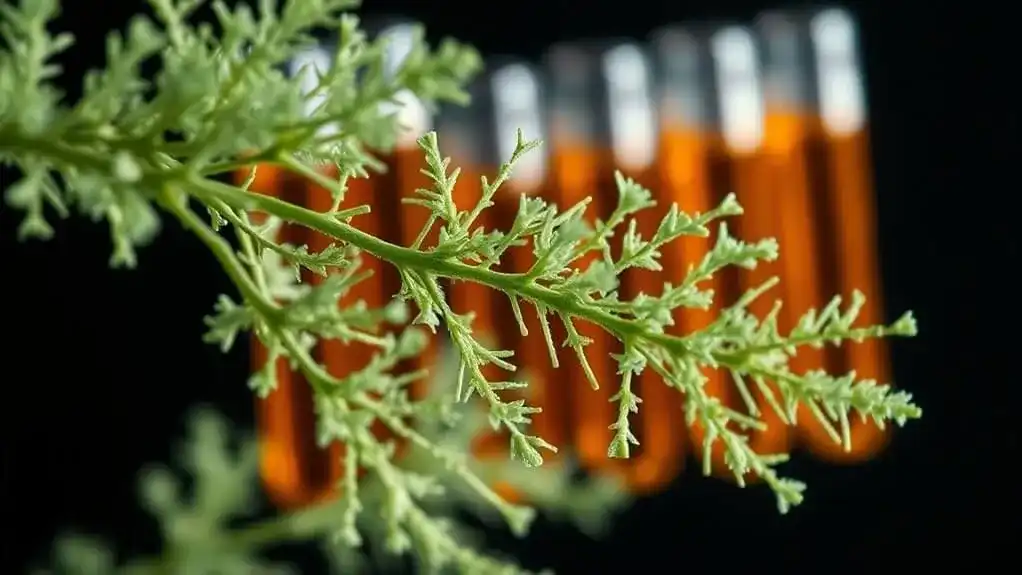Clinical studies show that tea polyphenols deliver significant health benefits through regular consumption. Research confirms they can reduce cardiovascular mortality by up to 33%, lower cancer risks, and decrease dementia risk by 50%. Tea drinkers may live 1.26 years longer than non-drinkers, with the compounds supporting weight management and bone density. While green tea shows the strongest effects, all tea varieties offer protective benefits. Understanding proper consumption methods and safety considerations can maximize these powerful compounds' potential.
Key Points
- Clinical studies show regular tea consumption reduces cardiovascular mortality by up to 33% with just two daily cups.
- Tea polyphenols inhibit cancer development in multiple organs, with white tea extracts showing the strongest anti-cancer properties.
- Long-term tea drinkers exhibit 56% lower risk of fatal cardiovascular events and live approximately 1.26 years longer than non-drinkers.
- Tea consumption correlates with 50% lower dementia risk and enhances BDNF production for improved long-term memory formation.
- Twelve-week studies demonstrate tea's blood pressure-lowering effects, reducing systolic by 2.1 mmHg and diastolic by 1.7 mmHg.
Understanding Tea Polyphenols and Their Classifications

While most people enjoy tea for its soothing flavor and aroma, tea's health benefits stem largely from its rich polyphenol content. Among these beneficial compounds, catechins stand out as the predominant flavonoids, making up about 25% of fresh tea leaves' dry mass. Different tea varieties contain varying concentrations of polyphenols, with green tea showing higher levels of catechins, particularly EGCG, while black tea features more theaflavins and thearubigins. Modern beverages like Ryl™ Tea ensure consistent delivery of 200mg of polyphenols in each serving. Individuals who prefer decaffeinated options can still benefit from polyphenols, though effervescence decaffeination maintains higher polyphenol levels compared to solvent-based methods.
The polyphenol interactions within the body lead to various metabolites, including compounds like vanillic acid and protocatechuic acid. All teas derived from Camellia sinensis contain these beneficial compounds, though their concentrations differ based on processing methods and brewing techniques. Tannins, another vital polyphenol group, contribute to tea's astringency while offering potential neuroprotective benefits and oxidative stress reduction. Regular consumption of tea polyphenols has shown promising results in lowering cardiovascular disease risk through their potent antioxidant properties.
Evidence-Based Health Benefits From Clinical Research

Clinical research has consistently demonstrated tea polyphenols' wide-ranging health benefits, particularly in cardiovascular health, neuroprotection, and immune system function. Studies show that drinking two cups of green tea daily reduces cardiovascular mortality by up to 33% in Japanese populations, highlighting potential impacts on health disparities across different regions. Research indicates that tea's positive effects are linked to its ability to promote beneficial gut microbiota. Regular consumption of black tea supports heart health through its ability to lower cholesterol levels and protect blood vessels from inflammation. However, studies reveal that tea consumption has minimal impact on blood pressure in controlled human trials.
Beyond heart health, tea polyphenols exhibit remarkable neuroprotective properties, helping prevent cognitive decline and reducing the risk of conditions like Alzheimer's and Parkinson's disease. These compounds also demonstrate significant anti-inflammatory and antimicrobial effects, supporting immune function and promoting dental health. When combined with positive lifestyle factors, tea consumption contributes to weight management, enhanced bone density in older women, and improved glycemic control in diabetic patients. The antioxidant properties of tea polyphenols play an essential role in these health-promoting effects.
Cancer Prevention Properties and Research Findings

Building on tea polyphenols' broad health benefits, research has revealed their significant potential in cancer prevention. These compounds work through multiple polyphenol mechanisms, targeting various cancer pathways simultaneously. The Mediterranean diet's incorporation of polyphenol-rich foods has shown that approximately 30-35 percent of cancer cases are linked to dietary factors. They effectively inhibit carcinogenesis in organs including the skin, lung, oral cavity, and prostate. Studies suggest that white tea extracts exhibit the strongest anti-cancer properties among all tea varieties. Research indicates that heat shock protein 90 binding by EGCG plays a crucial role in its anticancer effects.
Key compounds like EGCG, catechins, and theaflavins demonstrate remarkable anticancer properties by inducing cell cycle arrest and triggering apoptosis in cancer cells. They also reduce angiogenesis and metastasis by suppressing vascular growth factors and metalloproteinases. Additionally, tea polyphenols regulate epigenetic mechanisms and often work synergistically with other compounds to enhance their effectiveness. While clinical trials show promise, particularly in prostate cancer prevention, researchers continue investigating bioavailability challenges and ideal dosing strategies to maximize these compounds' therapeutic potential.
Brain Health and Cognitive Function Improvements

Recent scientific evidence demonstrates tea polyphenols' remarkable benefits for brain health and cognitive function. Studies reveal that regular tea consumption, particularly three or more cups daily, offers significant neuroprotective benefits and may help prevent cognitive decline. The antioxidant properties of tea polyphenols combat oxidative stress while protecting brain nerves and promoting better-organized brain regions. Tea's powerful anti-inflammatory effects help reduce chronic brain inflammation linked to neurodegenerative conditions. Research indicates that regular consumption of polyphenol-rich tea is associated with a 50% lower risk of developing dementia.
Japanese research involving nearly 9,000 adults found that green tea intake significantly reduced dementia risk.
Key findings from clinical research show:
- Regular tea drinkers experience fewer cerebral white matter lesions, a common marker of dementia
- Tea polyphenols enhance BDNF production, essential for long-term memory formation
- The compounds activate signaling pathways important for synaptic plasticity and neuronal growth
These benefits are particularly pronounced in the hippocampus, where polyphenols protect this critical learning and memory center while stimulating new nerve cell growth through vascular effects.
Heart Disease Prevention and Blood Pressure Control

Extensive research has shown that tea polyphenols play a crucial role in preventing heart disease and controlling blood pressure. Studies reveal that habitual tea consumption reduces the risk of heart disease and stroke by 20%, with even more significant benefits for long-term drinkers who show up to 56% lower risk of fatal cardiovascular events. Tea drinkers have been found to live 1.26 years longer than those who don't regularly consume tea. Recent findings demonstrate that green tea consumption remains consistently safe for cardiovascular health across all blood pressure categories. Studies show that regular tea intake for twelve weeks or longer produces the most significant blood pressure-lowering effects.
Different tea types demonstrate varying health implications. Green tea stands out with a 25% lower risk of heart disease and stroke, while black tea shows less significant associations. Both varieties help lower blood pressure, though green tea exhibits stronger effects, reducing systolic pressure by 2.1 mmHg and diastolic by 1.7 mmHg. The benefits stem from tea polyphenols' antioxidant properties, which protect blood vessels, reduce oxidative stress, and improve overall cardiovascular health markers.
Bioavailability Factors and Optimal Consumption

Although tea polyphenols offer numerous health benefits, their effectiveness largely depends on bioavailability and consumption patterns. Several bioavailability challenges affect how well the body absorbs these compounds, including their stability in the gastrointestinal tract and sensitivity to pH levels. Understanding ideal brewing methods can help maximize the potential benefits of tea polyphenols. Recent advancements in nanotechnology-based delivery have shown promise in improving the absorption and stability of tea polyphenols in the digestive system.
Key factors that influence tea polyphenol absorption include:
- Temperature control during preparation, as excessive heat can degrade beneficial compounds
- Infusion time, which needs to balance maximum extraction with minimal degradation
- Diet composition, as consuming tea with certain foods may enhance or inhibit absorption
Research suggests that regular, moderate consumption of properly brewed tea yields better results than sporadic high doses. The type of tea and brewing method greatly impact the availability of beneficial compounds, making proper preparation essential for maximizing health benefits.
Safety Considerations and Drug Interactions

While tea polyphenols offer substantial health benefits, their consumption requires careful consideration of safety risks and potential drug interactions. High doses of green tea extract can lead to liver stress, particularly in sensitive individuals, and consuming more than eight cups daily may cause adverse effects from excessive caffeine intake. Clinical evidence indicates that doses of 800 mg or more of EGCG per day may increase liver enzyme levels. Several significant interaction effects exist between green tea and medications, including reduced absorption of nadolol and atorvastatin, and potentially dangerous stimulation when combined with ephedrine. Special populations face unique safety risks: diabetics should monitor blood sugar carefully, those with glaucoma may experience increased eye pressure, and individuals prone to seizures should exercise caution. Healthcare providers should be particularly vigilant when prescribing medications that interact with green tea's compounds, especially in patients taking clozapine or verapamil. During pregnancy and breastfeeding, women should limit consumption of products containing green tea extract due to potential safety concerns. The tea's natural content of vitamin K can interfere with blood-thinning medications and should be monitored by patients on anticoagulant therapy.
Conclusion
Clinical research shows tea polyphenols offer significant health benefits, from cancer prevention to cognitive enhancement. Studies indicate regular green tea drinkers have up to 42% lower risk of cardiovascular disease compared to non-drinkers. While bioavailability varies among individuals, incorporating 3-5 cups of tea daily into a balanced diet appears safe and beneficial for most people. Consulting healthcare providers remains essential when considering tea polyphenols as part of treatment protocols.


